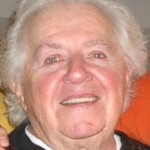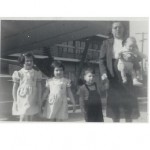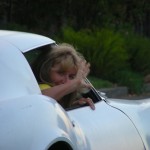Of the 45 “Instructions for Life” I typically share with my English students at the beginning of every semester, one of the most meaningful to me has always been #15 “Call Your Mother.”
 This post is dedicated to my mom, Rebecca Balcher, who passed away three years ago, five days after her 90th birthday.
This post is dedicated to my mom, Rebecca Balcher, who passed away three years ago, five days after her 90th birthday.
It was our ritual to talk on the phone every day — and sometimes more frequently — like when the Academy Awards were on TV and we’d have to make a call after the announcement of each major award.
 And four times a year I’d fly from California to Ohio to visit my mom, who lived alone in the home my five siblings and I had grown up in. One of those visits (when she was 82) was the last time I remember her “Driving Miss Shari.”
And four times a year I’d fly from California to Ohio to visit my mom, who lived alone in the home my five siblings and I had grown up in. One of those visits (when she was 82) was the last time I remember her “Driving Miss Shari.”
We’d set out early one evening to see a movie in a nearby neighborhood. Ninety minutes later we were back at home; neither of us remembered how to get to the theater. Fortunately, I knew how to get us home.
 A doctor diagnosed my mom with Alzheimer’s shortly thereafter, and we had to take away her car keys. I now have some idea of how she felt. I miss her very much
A doctor diagnosed my mom with Alzheimer’s shortly thereafter, and we had to take away her car keys. I now have some idea of how she felt. I miss her very much
Do you know any loved ones who ought to set aside their car keys?






It was nice to hear that commentary as I had the same mother! I also miss her very much. As for Alzheimer’s, many of us sadly deal with the experience of limiting what our elderly parents are able to do safely. We do the same for our children. Sometimes we have to impose restrictions on them for their own good. I don’t think doctors know everything, but I think that they feel responsible to make decisions to limit our own driving or other activities (even if we don’t agree)– for our own safety and for the safety of others. I would hate to hear that someone had an accident at the wheel which could have been avoided.
I laughingly remember a different kind of driving story of my mother’s. She was only in her 50′s but was taking my dad’s mom (86) shopping. Always wanting to seem totally prepared for every eventuality (and every imagined criticism) my mother mapped out the shopping center, discussed potential stores with my grandmother, and even decided ahead of time where they would eat lunch. What could go wrong?
Hours later, when they got back to the car, it would not start. Frustrated, my mom noticed a notice on the windshield, from parking lot security. They asked her to please shut off her car in the future and not leave it running in the parking lot, doors locked. Truth be told, she had run out of gas… And, yes, trying to impress my grandmother always made my mom that nervous.
Sandra,
I, too, was laughing heartily while reading your story. And, of course, one good story reminds us of another.
Before we took away mom’s keys and before we knew she had Alzheimer’s, there were clues: On one of my visits I noticed stockpiles of cleaning supplies, soft drinks, and other items that stores like to put on special. Apparently, my mom would go shopping, find a great sale, load up, bring the items home . . . and then hide them in places when she found that she’d already stocked up on earlier occasions.
I miss my mom.
Shari, I will bet when you think of your mom that you think of her good days and sense of humor. I find way too many people who get hung up on someone’s bad days, a poor decision, or a one-time opinion. Here is where I am coming from:
A friend talks about her former mother-in-law in only negative terms, concentrating on the forgetfulness she experienced in the last years of her life. While it is true that she drove poorly and likely should have had her license revoked, she was also a great entertainer and a champion for her kids.
I am thinking that we can focus on the 99% good days and let the deceased take the faults of their lives with them! And, if it is true that what we focus on comes true, we are paving the road to our own futures with compassion and not criticism.
Too bad I never met your mom but am pretty sure there are a lot of her good qualities in you!
Sandra, two beautiful things come to mind with this opportunity to chat: (1) to hear a story that reminds us what it means to be human and (2) another opportunity to “kvell” [i.e. fill up with emotion] in memory of my wonderful mom. Thanks for the vote of confidence; I’m proud to carry on some of my mom’s educational efforts.
We tried! logical conversation about it was futile. anonymous letters to the DMV were the way to go. but alas, Delaware DMV told her to guess at the vision test (she’s blind in one eye). and then passed her. hmmm. suggestions?
This story of an aging couple reminded me of DRIVING MISS SHARI
No Left Turns
This is a story of an aging couple . . . told by their son who was President of NBC NEWS, Michael Gartner:
My father never drove a car. Well, that’s not quite right. I should say I
never saw him drive a car.
He quit driving in 1927, when he was 25 years old, and the last car he drove
was a 1926 Whippet.
“In those days,” he told me when he was in his 90s, “to drive a car you had
to do things with your hands, and do things with your feet, and look every which
way, and I decided you could walk through life and enjoy it or drive through
life and miss it.”
At which point my mother, a sometimes salty Irishwoman, chimed in:
“Oh, bull shit!” she said. “He hit a horse.”
“Well,” my father said, “there was that, too.”
So my brother and I grew up in a household without a car. The neighbors all
had cars — the Kollingses next door had a green 1941 Dodge, the VanLaninghams
across the street a gray 1936 Plymouth, the Hopsons two doors down a black 1941
Ford — but we had none.
My father, a newspaperman in Des Moines , would take the streetcar to work
and, often as not, walk the 3 miles home. If he took the streetcar home, my
mother and brother and I would walk the three blocks to the streetcar stop, meet
him and walk home together.
My brother, David, was born in 1935, and I was born in 1938, and sometimes,
at dinner, we’d ask how come all the neighbors had cars but we had none. “No one
in the family drives,” my mother would explain, and that was that.
But, sometimes, my father would say, “But as soon as one of you boys turns
16, we’ll get one.” It was as if he wasn’t sure which one of us would turn 16
first.
But, sure enough , my brother turned 16 before I did, so in 1951 my parents
bought a used 1950 Chevrolet from a friend who ran the parts department at a
Chevy dealership downtown.
It was a four-door, white model, stick shift, fender skirts, loaded with
everything, and, since my parents didn’t drive, it more or less became my
brother’s car.
Having a car but not being able to drive didn’t bother my father, but it
didn’t make sense to my mother.
So in 1952, when she was 43 years old, she asked a friend to teach her to
drive. She learned in a nearby cemetery, the place where I learned to drive the
following year and where, a generation later, I took my two sons to practice
driving. The cemetery probably was my father’s idea. “Who can your mother hurt
in the cemetery?” I remember him saying more than once.
For the next 45 years or so, until she was 90, my mother was the driver in
the family. Neither she nor my father had any sense of direction, but he loaded
up on maps — though they seldom left the city limits — and appointed himself
navigator. It seemed to work.
Still, they both continued to walk a lot. My mother was a devout Catholic,
and my father an equally devout agnostic, an arrangement that didn’t seem to
bother either of them through their 75 years of marriage.
(Yes, 75 years, and they were deeply in love the entire time.)
He retired when he was 70, and nearly every morning for the next 20 years or
so, he would walk with her the mile to St. Augustin’s Church.
She would walk down and sit in the front pew, and he would wait in the back
until he saw which of the parish’s two priests was on duty that morning. If it
was the pastor, my father then would go out and take a 2-mile walk, meeting my
mother at the end of the service and walking her home.
If it was the assistant pastor, he’d take just a 1-mile walk and then head
back to the church. He called the priests “Father Fast” and “Father Slow.”
After he retired, my father almost always accompanied my mother whenever she
drove anywhere, even if he had no reason to go along. If she were going to the
beauty parlor, he’d sit in the car and read, or go take a stroll or, if it was
summer, have her keep the engine running so he could listen to the Cubs game on
the radio. In the evening, then, when I’d stop by, he’d explain: “The Cubs lost
again. The millionaire on second base made a bad throw to the millionaire on
first base, so the multimillionaire on third base scored.”
If she were going to the grocery store, he would go along to carry the bags
out — and to make sure she loaded up on ice cream. As I said, he was always the
navigator, and once, when he was 95 and she was 88 and still driving, he said to
me, “Do you want to know the secret of a long life?”
“I guess so,” I said, knowing it probably would be something bizarre.
“No left turns,” he said.
“What?” I asked.
“No left turns,” he repeated. “Several years ago, your mother and I read an
article that said most accidents that old people are in happen when they turn
left in front of oncoming traffic.
As you get older, your eyesight worsens, and you can lose your depth
perception, it said. So your mother and I decided never again to make a left
turn.”
“What?” I said again.
“No left turns,” he said. “Think about it.. Three rights are the same as a
left, and that’s a lot safer. So we always make three rights.”
“You’re kidding!” I said, and I turned to my mother for support.
“No,” she said, “your father is right. We make three rights. It works.”
But then she added: “Except when your father loses count.”
I was driving at the time, and I almost drove off the road as I started
laughing.
“Loses count?” I asked.
“Yes,” my father admitted, “that sometimes happens. But it’s not a problem.
You just make seven rights, and you’re okay again.”
I couldn’t resist. “Do you ever go for 11?” I asked.
“No,” he said ” If we miss it at seven, we just come home and call it a bad
day. Besides, nothing in life is so important it can’t be put off another day
or another week.”
My mother was never in an accident, but one evening she handed me her car
keys and said she had decided to quit driving. That was in 1999, when she was
90.
She lived four more years, until 2003. My father died the next year, at 102.
They both died in the bungalow they had moved into in 1937 and bought a few
years later for $3,000. (Sixty years later, my brother and I paid $8,000 to have
a shower put in the tiny bathroom — the house had never had one. My father
would have died then and there if he knew the shower cost nearly three times
what he paid for the house.)
He continued to walk daily — he had me get him a treadmill when he was 101
because he was afraid he’d fall on the icy sidewalks but wanted to keep
exercising — and he was of sound mind and sound body until the moment he died.
One September afternoon in 2004, he and my son went with me when I had to
give a talk in a neighboring town, and it was clear to all three of us that he
was wearing out, though we had the usual wide-ranging conversation about
politics and newspapers and things in the news.
A few weeks earlier, he had told my son, “You know, Mike, the first hundred
years are a lot easier than the second hundred.” At one point in our drive that
Saturday, he said, “You know, I’m probably not going to live much longer.”
“You’re probably right,” I said.
“Why would you say that?” He countered, somewhat irritated.
“Because you’re 102 years old,” I said..
“Yes,” he said, “you’re right.” He stayed in bed all the next day.
That night, I suggested to my son and daughter that we sit up with him
through the night.
He appreciated it, he said, though at one point, apparently seeing us look
gloomy, he said:
“I would like to make an announcement. No one in this room is dead yet”
An hour or so later, he spoke his last words:
“I want you to know,” he said, clearly and lucidly, “that I am in no pain. I
am very comfortable. And I have had as happy a life as anyone on this earth
could ever have.”
A short time later, he died.
I miss him a lot, and I think about him a lot. I’ve wondered now and then how
it was that my family and I were so lucky that he lived so long.
I can’t figure out if it was because he walked through life,
Or because he quit taking left turns. ”
Life is too short to wake up with regrets.
So love the people who treat you right.
Forget about the one’s who don’t.
Believe everything happens for a reason.
If you get a chance,take it & if it changes your life, let it.
Nobody said life would be easy, they just promised it would most likely be worth
it.”
ENJOY LIFE NOW – IT HAS AN EXPIRATION DATE!
For all mom’s great traits, compassion for other people was by far her most precious.
Thanks for weighing in Chuck. But how about joining the party on my first blog where I’m collecting 500 comments: http://sharisax.com/DrivingMissShari/2010/08/how-to-become-rich-famous-on-the-web/
My grandmother was an amazing woman. Had she been born in a different time, there’s no telling what she would have been able to do. She came from a family of 13 kids (hard to imagine on many levels!), was not highly educated but read voraciously so she could converse with almost anyone about SOMETHING. She opened her home to us, to our friends and delighted in getting into her car and going whenever and wherever she pleased. My mother used to call her “lead foot” (she liked to put the pedal to to the metal at times.. go granny go!). Then her eyesight started to fail. She was diagnosed with Glaucoma and as time went on, the inevitable happened. We took her license away. It broke her spirit. She was never quite the same again. Losing that license… no small thing. She did not live in a place where there was an abundance of convenient public transportation, but I don’t think it would have mattered to her even it she had that access. I adored her and I will never forget how it changed her.
Kathy, thank you so much for sharing this beautiful story. After my very brief experience I do know firsthand some of the pains & losses, and, of course, now I appreciate this “privilege” in ways I had not previously imagined.
I would like to support efforts to address the myriad of problems facing those who can no longer drive — especially those who really shouldn’t or can’t have a set of their own car keys ever again.
We wrote an anonymous letter to the DMV regarding Mom! That didn’t work even though she’s blind in one eye and cannot see the Eye Chart…she guessed! So we just prayed every night that our mother and others on the road would be alive for another day. God answered…he killed the car. and touched her heart so that she accepted it. She gets lonely ’cause she doesn’t get out much now. So her children call her more often. We do love her. She was and still is a gooood mommy.
Well, I just may be the next one in my family to have to give up the keys — 19 years before my mother! (I’m just turning 60.)
Years ago I stopped driving at night to unfamiliar places, but just last night en route to the library (20+ times before – and at night), I made a left turn into a field! Thank God it wasn’t a deep ditch. We have a lot of them here. I couldn’t see the intersection with all headlights from the oncoming rush hour traffic. I thought I was there. Obviously not! I was shaken and could have caused a very bad accident.
Just last week while chatting with Mother…she said, “when it starts to feel uncomfortable, it’s time to stop.” I think it’s time to stop driving at night. Oh, and I’m overdue for an eye exam. I’ll make that appt today! Unlike my mother, however, I simply love being chauffered and loved public transportation when I lived in the city. I’ve had future plans to budget for taxis/trains, but I may have to step that up, huh?
Seems like a WISE decision to me . . . Too many people wait until they really aren’t capable of making appropriate choices.
Hi, My 90-year-old dad is still driving and is blind in one eye.
I don’t think he drives very much, but still he shouldn’t be driving at all. Good questions, how to have the car keys be permanently misplaced???
Suzie Adams Koide recently posted..How often do you say- “I wish I had more energy”
Suzie, is your Dad in California . . . or another state? Have you checked out the laws there?
Pingback: Mike Maynard
Read more from Mike Maynard, my blog-within-a-blogger: http://sharisax.com/DrivingMissShari/2010/09/guest-blogger-mike-maynard-wit-farmville-strategies/